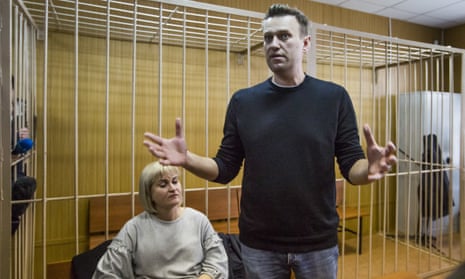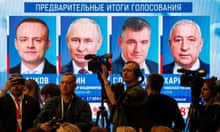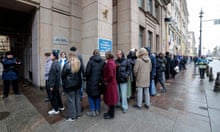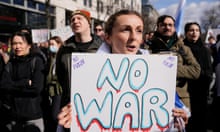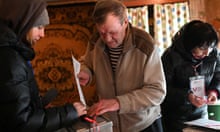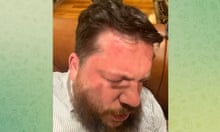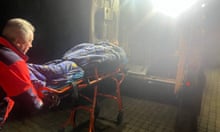Russian opposition leader Alexei Navalny has been fined and sentenced to 15 days in prison, a day after some of the biggest anti-government protests since Vladimir Putin returned to the presidency in 2012 swept the country.
Navalny was jailed and given a 20,000-rouble (£280) fine by a Moscow court for disobeying police orders and organising the protests, which led to more than 1,000 people being detained.
The opposition leader has declared his intention to run for president next year, an election in which the president, Vladimir Putin, is expected to stand for, and almost certainly win, a new six-year term.
Before sentencing, Navalny tweeted a defiant selfie from court, writing: “The time will come when we will have them on trial (but honestly).”
Всем привет из Тверского суда. Настанет время, когда и мы будем их судить (только уже честно) pic.twitter.com/zs6ueJMM8o
— Alexey Navalny (@navalny) March 27, 2017
He was upbeat during his hearing, asking the judge to summon the prime minister, Dmitry Medvedev, as a witness to “explain why so many people protested”.
Thousands of people rallied in dozens of cities across Russia on Sunday following a call by Navalny to protest over an investigation into Medvedev’s alleged corruption. Navalny’s team released a video alleging Medvedev had amassed a collection of palaces, yachts and vineyards during his time in office.
Authorities in most cities – from Chita in Siberia to Makhachkala in Dagestan – denied permission for the rallies. Police arrested those who were holding posters or chanting, and also on occasion simply swept random people off the street.
Guardian correspondent Alec Luhn was among those arrested, despite having Russian journalistic accreditation. He was held for hours and charged with participating in an unsanctioned demonstration before being released after the foreign ministry intervened.
A rights group monitoring the arrests said on Monday morning that 1,030 people had been detained in Moscow alone. About 120 remained in custody on Monday morning. The majority of those released were charged with the minor offence of taking part in an unsanctioned demonstration and are likely to be fined.
In Nizhny Novgorod, parents of five children who took part in the protests were charged with “improper parenting”, according to Interfax news agency.
Employees of Navalny’s Anti-Corruption Foundation were also arrested and his office was searched by police, who seized computers and sealed the premises.
The protests were largely attended by younger Russians, who came out despite a near blackout of news about the event on Russian state media, which has ignored the protests and arrests.
On Monday, the EU appealed to Russian authorities to release those still being held. “We call on the Russian authorities to abide fully by the international commitments it has made, including in the Council of Europe … to uphold these rights and to release without delay the peaceful demonstrators that have been detained,” it said.
Amnesty International said its observers had witnessed “excessive force” used by police and called on Russia to release all prisoners immediately.
Kremlin spokesman Dmitry Peskov rejected the calls, describing the protests as “a provocation” and claiming that some teenagers had been promised cash if they were arrested. He said the response of police had been “highly professional and lawful” and said Putin had been informed that “an illegal action” had taken place in central Moscow.
Authorities have struggled to deal with the political threat posed by Navalny. In recent years, he has been put on several trials, widely believed to be politicised, and his brother has been jailed. At times, authorities have experimented with allowing him to take part in politics, and he stood for mayor of Moscow in 2013, winning 27% of votes. Although he has declared his intention to stand for president next year, it is unlikely he will be allowed on to the ballot.
Speaking from the defendant’s bench on Monday, Navalny told reporters: “Even the slightest illusion of fair justice is absent here. Yesterday’s events have shown that quite a large number of voters in Russia support the programme of a candidate who stands for fighting corruption. These people demand political representation and I strive to be their political representative.”

Sunday’s protests were some of the largest since a wave of anti-Kremlin street demonstrations in 2011-12. They concluded with a massive protest on 6 May 2012, the day before Putin returned to the presidency after four years as prime minister. Dozens of people who participated in clashes at the protest were put on trial and many sentenced to long jail terms.
Authorities will have to decide between a similar crackdown or trying to weather the protest mood in the year leading up to the presidential election next March.
Mikhail Zygar, a Russian journalist who recently wrote a book about Putin’s inner circle, suggested that many of the young demographic that made up so much of the protesting crowd may not be anti-Putin.
While there were occasional chants of “Russia without Putin”, the anti-Medvedev slant of the protest agenda allowed it to attract more people, Zygar wrote on Facebook. “The majority of under-25s think we have brilliant foreign policy, but a terrible domestic policy,” he wrote. Many see Putin as a hero, while Medvedev and his government are held responsible for problems at home, Zygar wrote.
Medvedev, who was president from 2008-12, has not made an official response to the corruption claims. He answered a comment on his official Instagram account asking how his day was on Sunday by writing: “Not bad! Went skiing.” He accompanied it with a winking emoji face.
